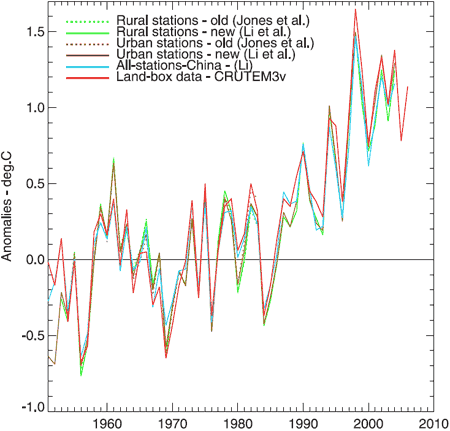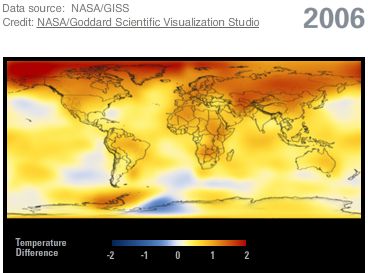Does Urban Heat Island effect exaggerate global warming trends?
What the science says...
| Select a level... |
 Basic
Basic
|
 Intermediate
Intermediate
| |||
|
Urban and rural regions show the same warming trend. |
|||||
Climate Myth...
It's Urban Heat Island effect
A paper by Ross McKitrick, an economics professor at the University of Guelph, and Patrick Michaels, an environmental studies professor at the University of Virginia, concludes that half of the global warming trend from 1980 to 2002 is caused by Urban Heat Island. (McKitrick & Michaels)
The Urban Heat Island Effect (UHI) is a phenomenon whereby the concentration of structures and waste heat from human activity (most notably air conditioners and internal combustion engines) results in a slightly warmer envelope of air over urbanised areas when compared to surrounding rural areas. It has been suggested that UHI has significantly influenced temperature records over the 20th century with rapid growth of urban environments.
Scientists have been very careful to ensure that UHI is not influencing the temperature trends. To address this concern, they have compared the data from remote stations (sites that are nowhere near human activity) to more urban sites. Likewise, investigators have also looked at sites across rural and urban China, which has experienced rapid growth in urbanisation over the past 30 years and is therefore very likely to show UHI. The difference between ideal rural sites compared to urban sites in temperature trends has been very small:

Figure 1. Annual average temperature anomalies. Jones et al (dotted green and brown) is a dataset of 42 rural and 42 urban sites. Li et al (solid green and brown) is an adjusted dataset of 42 rural and 40 urban sites. Li (blue) is a non-adjusted set of 728 stations, urban and rural. CRUTEM3v (red) is a land-only data set (Brohan et al., 2006). This plot uses the 1954–83 base period.
Another way to explore the UHI would be to look at where the majority of warming has occurred across the globe. The UHI should match where most people live. However, if you look at the 2006 global temperature anomaly (figure 2.), you find that the greatest difference in temperatures for the long term averages where across Russia, Alaska, far north Canada and Greenland and not where major urbanisation has occurred.

Figure 2. Using source data from NASA/GISS, this illustration shows the amount of change in global surface temperatures in 2006 from 1885.
The Urban Heat Effect has no significant influence on the record of global temperature trends.
Basic rebuttal written by mothincarnate
Update July 2015:
Here is a related lecture-video from Denial101x - Making Sense of Climate Science Denial
Last updated on 5 July 2015 by pattimer. View Archives































 Arguments
Arguments









































@mihai#75:
I don't have time to read that paper right now, but can I refer you to post #61 above? The list of authors identifies multiple people that can safely be filed under 'usual suspects'!
mihai @75,
The recent paper you refer-to Soon et al (2023) 'The Detection and Attribution of Northern Hemisphere Land Surface Warming (1850–2018) in Terms of Human and Natural Factors: Challenges of Inadequate Data' isn't that 'recent' and its content is likely 99% recycled from earlier offerings, it being the latest offering from Willie Soon and the Connolly brothers. (The phalanx of co-authors are likely no more than window dressing and not contributors to the work. It is not impossible that a fair few of them had no knowledge of this co-authorship.)
The main authors are "infamous" both for their climate denial and also their remarkable incompetence. They do however manage to string words together to create very lengthy papers, and in this case the offering comprised three lengthy papers (the other two here & here). As for the egregious error they have actually managed to incorporate into these particular offerings, that would take somebody to read through the drivel they present, no easy task when error is piled so high on error. Luckily, somebody has already done so, although for a detailed blow-by-blow rebuttal, there was a rebuttal of the rebuttal from Soon which was just as error-filled as the initial offering.
Just an Idea. Urbanisation has historically been correlated with (more) air pollution. Air pollution has a local (temporary) colling effect. Isn't it possible, that above average increases in temperature caused by urbanisation didn't show up in the data because of that correlation? One proofable prediction from that theory would be that at least in Europe in recent decades temperatures in urban areas must have grown faster than in rural areas since air has gotten much cleaner in the cities, causing a "temperature catch-up-effect". Also there is a trend in European cities to regreen, which would have the opposite effect.